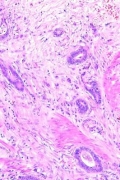FROM SCHIZOPHRENIA BULLETIN
Young people in the United States experiencing first-episode psychosis face a mortality risk that is 24 times greater than that of their peers in the general population, a new study shows.
“The hugely elevated mortality observed here underscores that young people experiencing psychosis warrant intensive clinical attention,” wrote Michael Schoenbaum, PhD, senior adviser for mental health services, epidemiology, and economics at the National Institute of Mental Health, and his associates. “In the general population, only individuals over 70 years of age have all-cause 12-month mortality approaching the rates we observed among young psychosis patients here.”
The researchers analyzed data on about 5,000 people aged 16-30 with commercial health insurance coverage who had a new ICD-9 diagnosis of schizophrenia, brief psychotic disorder, or psychotic disorder not otherwise specified, and followed them for 12 months. They limited the sample to people who had continuous insurance coverage over a period of 12 months or greater before their first observed diagnosis of psychosis – which they called the “index diagnosis.”
For the entire psychosis cohort, the 12-month mortality was 2.0% (1,968 per 100,000 people), compared with less than 0.1% in the general population (89 per 100,000). The researchers further found mortality “an order of magnitude higher in those with incident psychosis after age 25, compared with those with an incident diagnosis between ages 16 and 20” ( Schizophr Bull. 2017 Apr 7. doi: 10.1093/schbul/sbx009 ).
Information on the cause of death was not available, but the researchers were able to look at the diagnoses that the decedents had received 12 months before their index psychosis diagnosis. Fifteen of the decedents had been diagnosed with cancer, nine with renal disease (end-stage), and one with cystic fibrosis. When those patients were removed from the mortality cohort, the 12-month mortality stood at 1.5%, a rate they said was 18 times higher than mortality in the general population.
“These findings show the importance of tracking mortality in individuals with mental illness,” Dr. Schoenbaum said in a statement . “Health systems do this in other areas of medicine, such as cancer and cardiology, but not for mental illness. Of course, we also need to learn how these young people are losing their lives.”
The study might not be generalizable because the cohort studied had access to continuous access to health insurance coverage “before and after the index psychosis diagnosis.” Also, the size of the cohort was relatively small. Nevertheless, they said, the findings are consistent with other studies showing that care for those with early psychosis falls short.
“Taken together, these findings provide a strong rationale for initiatives to improve early identification and integrated treatment for psychotic disorders in U.S. treatment settings,” Dr. Schoenbaum and his associates wrote.
The Commonwealth Fund provided support for the study. The researchers reported having no conflicts of interest, and said the views expressed in the study are their own and do not necessarily reflect those of the National Institute of Mental Health, or any other organizations or entities.
ghenderson@frontlinemedcom.com
On Twitter @ginalhenderson






